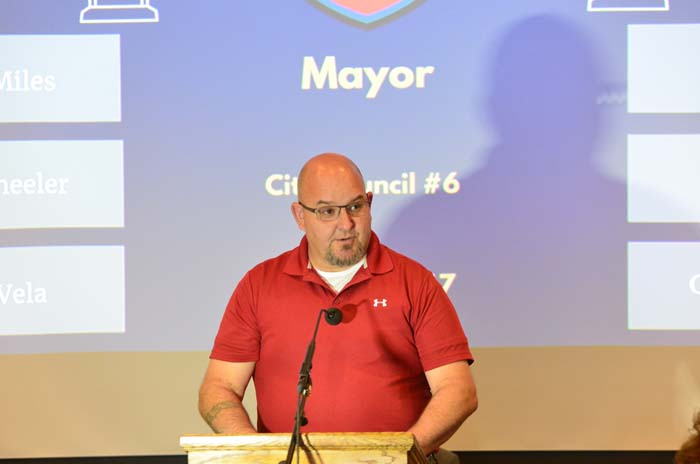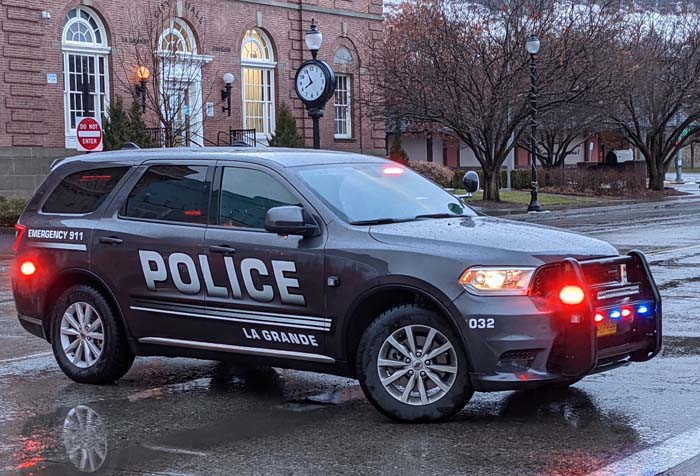La Grande city council, mayor candidates participate in town hall forum
Published 11:00 am Wednesday, October 12, 2022

- Rock
LA GRANDE — Voters got a closer look at the six candidates running for contested positions in the upcoming November city council and mayoral election during a town hall-style forum at Eastern Oregon University’s Zabel Hall on Tuesday, Oct. 11.
Trending
The forum on the La Grande campus gave residents a chance to ask the candidates about important topics, covering issues such as homelessness, marijuana sales and economic development within the city.
Mathew Miles and current City Councilor Justin Rock are vying for the mayor position, while the council’s sixth position has two contenders — David Moyal and Denise Wheeler. Cody Vela and former City Councilor Corrine Dutto are running for the seventh position, the spot now held by Rock.
The review committee — consisting of EOU junior Calvin Bennett, current La Grande Mayor Steve Clements and former City Councilor John Lackey — chose questions from the ones submitted for the candidates to answer. EOU sophomore Isaac Insko acted as the moderator for the evening, ensuring each candidate received two minutes at the podium.
Trending
Homelessness
Wheeler was first to speak about the increasing homeless population in La Grande, questioning whether having a warming station in the city was a good thing. She believes it may lead to an increase in the homeless population within the city. Wheeler said the help religious institutions provide to the homeless may be an avenue the city council should explore.
Moyal pointed out that the city currently does not have a warming station set up for this upcoming winter. He said homelessness is on the rise across the state and suggested looking at what other cities are doing to deal with the issue. One idea would be to implement more restrictive ordinances on the appropriate use of city parks, he said.
All candidates agreed that mental health and substance abuse disorders were underlying issues that need to be focused on in order to address the homelessness crisis.
Vela called the homeless problem the “real pandemic” and contended that many people were choosing to live on the streets, tying the issue to decriminalization of drugs with Measure 110 and the impact on both the police department and first responders.
Dutto agreed that the police department’s hands are tied with the passage of Measure 110. She said that the city has some opportunities to work on homelessness, but that it needed to be addressed within the constitutional rights of all citizens. Dutto pushed back on the idea that homeless people were coming to La Grande from other areas — citing a study of the local homeless population that found a large majority were locals. She said the issue was tied to lack of affordable housing and exorbitant move-in fees.
Rock spoke about what the current city council is doing to address the issue. The police are working with public parks to get stricter rules on tent camping. Rock said that as mayor he would want to work with the Center for Human Development to get help for the people who need it.
Miles echoed similar sentiments to the other candidates — speaking about the restriction of Measure 110 and the need to partner with mental health services. He ended by saying that we need to have empathy for those who are suffering.
Financial prospects of marijuana sales within the city
Moyal was the only candidate who spoke openly in favor of ending the moratorium on the sale and distribution of recreational marijuana. He said it was strictly an economic issue, not a moral one.
Moyal argued that having the moratorium is not preventing anyone who wants to smoke from getting marijuana — the only thing it is doing is keeping La Grande from the economic benefits.
Wheeler, Vela and Miles all believed the moratorium should remain in place. Wheeler said that having the moratorium keeps La Grande from “that moral decay,” and Miles said allowing the sale would be a “slippery slope.” Vela argued that it is too late for La Grande to capitalize on the economic impacts.
Both Dutto and Rock were on the council when the issue was voted on in 2015. Dutto said that she was originally against the moratorium but voted in favor of the ban after hearing how many residents opposed the sale of recreational marijuana within the city. Rock, who also voted in favor of the moratorium, said he still supports that decision.
However, he said that if residents feel strongly about the issue, he supports them going out to get the signatures and putting it back on the ballot.
Economic development and downtownAll the candidates agreed that supporting local businesses and retaining businesses were vital to the economic success of the city. Everyone recognized the success of the Urban Renewal Agency and business projects funded by the city.
Wheeler said the housing market is a vital part of ensuring businesses come to La Grande. Moyal and Dutto also spoke about the economic impact of the housing problem in response to other questions.
Both Rock and Miles pushed for the need of economic development outside of just the downtown area.
Vela tied the issue to public safety. He said that the city needs to show local entrepreneurs that they can operate safely and with limited risk within the city. Vela also said an important component of increasing community engagement downtown was cleaning up Max Square.
Other unique suggestions came from Moyal and Dutto. Moyal suggested expanding the focus of downtown revitalization and restoration to also include Jefferson Avenue. Dutto said that she would like to see more partnerships with Eastern Oregon University to get students downtown and engaged with the community.
On Nov. 8, voters will cast their preferences in the midterm election. But to do so, they need to register by Oct. 18, and the following day ballots start going out.









